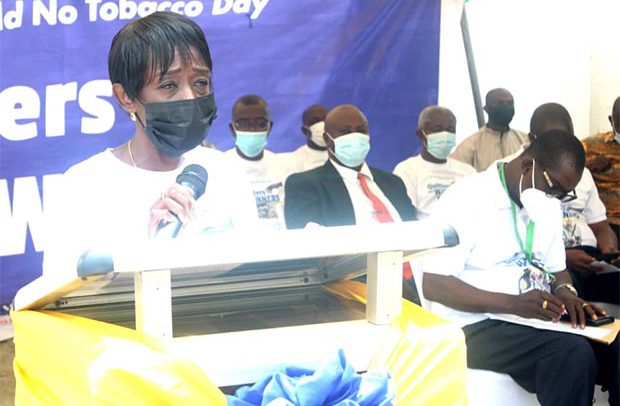Delese Mimi Darko – CEO of FDA
The Food and Drugs Authority (FDA) and its partner agencies have launched a year-long campaign to support people who plan to quit tobacco use through the creation of communities of quitters.
The campaign is aimed at expanding access to cessation services through referrals and empowering tobacco users with the requisite information to motivate them to quit.
The FDA will also use its routine public education in schools, marketplaces and transport terminals as a platform to address specific challenges encountered by smokers in their quest to quit smoking.
Chief Executive Officer of the FDA, Delese Mimi Darko, revealed this during the commemoration of World No Tobacco Day 2021 held at the Nsawam public transport terminal and market in the Eastern Region.
The theme for this year’s World No Tobacco Day is “Commit to Quit”, which is largely informed by recent studies by the WHO indicating that millions of tobacco users around the world have declared their intentions to quit in the wake of the Covid–19 pandemic.
Mrs. Darko said the “Commit to Quit” campaign is to help create a healthier environment that is conducive for quitting tobacco use by advocating for stronger tobacco cessation policies, increasing access to cessation services, raising awareness of tobacco industry tactics, and empowering tobacco users to make successful quit attempts through “quit & win” initiatives.
“I am reliably informed that the WHO has set up a Digital Access Initiative for Quitting Tobacco and has partnered with tech companies like Facebook, WhatsApp to give free access to digital counselling, raise awareness and support tobacco users to quit,” she added.
Minister of Health, Kwaku Agyeman-Manu in a speech read on his behalf said there are devastating effect of tobacco use on the respiratory system which increases the severity of respiratory diseases and non-communicable diseases such as cancer, respiratory disease and diabetes.
“This put people with these conditions at higher risk for developing severe illness when affected by Covid-19. Tobacco also affects productivity as smokers miss work more frequently for illness and employees end up paying more money to cater for health care insurance to cover smokers,” he said.
He indicated that the country is making significant progress to reduce tobacco use considerably by effectively enforcing the complementary smoke-free policies through the implementation of the Public Health Act 2012, (ACT 851) and the Tobacco Control Regulations, 2016 (LI. 2247).
“Other interventions include the introduction of Pictorial Health Warming on tobacco product packages which are aimed at effectively communicating the health hazards associated with tobacco use,” he added.
The WHO Regional Director for Africa, Dr Matshidiso Moeti in a solidarity message, indicated that all forms of tobacco are harmful and there is no safe level of exposure to second-hand smoke.
“E-cigarette use increases the risk of heart disease and lung disorder and the nicotine in their products can impair brain development in children. Smoking shisha is as harmful as other forms of tobacco use and chewing tobacco can causing mouth cancer tooth loss and gum disease,” she said.
The WHO called on the youth to join the fight against the tobacco epidemic by building a movement for a tobacco free generation.
Globally, tobacco kills more than 8 million people annually. More than 7 million of these deaths are from direct tobacco use and around 1.2 million are due to non-smokers who are exposed to second-hand smoke.
According to the Tobacco Atlas Ghana, over 807,600 people smoke cigarettes and other tobacco products in Ghana.
Seventy-five men also die every week through smoking and using tobacco and tobacco products in Ghana with the youth are moving away from the traditional tobacco use to the electronic tobacco due to its appeal in the form of flavouring and the myth that they are safer alternatives like Shisha and electronic or e-cigarette which are equally dangerous to human health.
It is worrying to note that this new trend of tobacco use is higher among young female adults than in males, according to the Ghana Youth Tobacco Survey ,2017 (0.4% of boys, and 1.7% of girls currently smoked Shisha).
By Jamila Akweley Okertchiri


